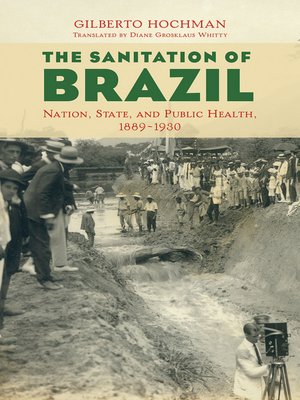The Sanitation of Brazil
ebook ∣ Nation, State, and Public Health, 1889-1930 · Lemann Center for Brazilian Studies Series
By Gilberto Hochman

Sign up to save your library
With an OverDrive account, you can save your favorite libraries for at-a-glance information about availability. Find out more about OverDrive accounts.
Find this title in Libby, the library reading app by OverDrive.



Search for a digital library with this title
Title found at these libraries:
| Library Name | Distance |
|---|---|
| Loading... |
Celebrated as a major work since its original publication, The Sanitation of Brazil traces how rural health and sanitation policies influenced the formation of Brazil's national public health system. Gilberto Hochman's pioneering study examines the ideological, social and political forces that approached questions of health and government action. The era from 1910 to 1930 offered unique opportunities for public health reform, and Hochman examines its successes and failures. He looks at how health became a state concern, tying the emergence of public health policies to a nationalistic movement and to a convergence of the elites' social consciousness with their political and material interests. Politicians weighed the costs and benefits of state-run public health versus the burdens imposed by disease. Physicians and intellectuals, meanwhile, swayed them with warnings that endemic disease and official neglect might affect everyone—rich and poor, rural and urban, interior and coastal—if left unchecked. The book shows how disease and health were and are associated with nation-state building in Brazil.|
Title Page
Copyright
Contents
Preface
Translator's Note
Chapter 1. When Health Becomes Public: State Formation and Health Policies in Brazil
Chapter 2. The Microbe of Disease and Public Power: The Public Health Movement and a Growing Consciousness of Interdependence
Chapter 3. Public Health Reform; or, Who Should Be Responsible for Communicable Diseases?
Chapter 4. Consciousness Converges with Interests: A National Public Health Policy
Chapter 5. São Paulo Exceptionalism?: Political Autonomy and Public Health Interdependence
Chapter 6. Final Thoughts
Appendix 1. Institutions, Agencies, and Departments
Appendix 2. States and Territories of Brazil under the First Republic (1889–1930)
Notes
Bibliography
Index
|
"This book is an overdue and essential contribution to the literature in English on the history of health, state formation, and Brazilian political and social history." —The Americas
"We are very fortunate to have this lucid translation of Gilberto Hochman's brilliant study of the expansion of public health in early twentieth century Brazil, a complex process that involved ideological and pragmatic calculations of regional autonomy, centralized authority, and the high human cost of disease across a vast and varied country. This history elucidates the foundations of Brazil's extensive modern health system and offers a model for political analysis of the state and health."—Alexandra Minna Stern, author of Eugenic Nation: Faults and Frontiers of Better Breeding in Modern America
"Finally, Gilberto Hochman's classic account of public health policy, citizenship, and state-building during Brazil's First Republic is available beyond the Portuguese-reading world. This prize-winning volume offers a crucial historical perspective on the complex politics of constructing collective health, all the more resonant today as Brazil's admired national health system is under assault."—Anne-Emanuelle Birn, co-editor of Comrades in Health: US Health Internationalists, Abroad and at Home
|Gilberto Hochman is a researcher and professor at the Casa de Oswaldo Cruz, Fundação Oswaldo Cruz. His other books include Cuidar, Controlar, Curar, Políticas Públicas no Brasil, and Médicos Intérpretes do Brasil. Diane Grosklaus Whitty's translations include The Devil and the Land of the Holy Cross: Witchcraft, Slavery, and Popular Religion in Colonial Brazil.
"We are very fortunate to have this lucid translation of Gilberto Hochman's brilliant study of the expansion of public health in early twentieth century Brazil, a complex process that involved ideological and pragmatic calculations of regional autonomy, centralized authority, and the high human cost of disease across a vast and varied country. This history elucidates the foundations of Brazil's extensive modern health system and offers a model for political analysis of the state and health."—Alexandra Minna Stern, author of Eugenic Nation: Faults and Frontiers of Better Breeding in Modern America
"Finally, Gilberto Hochman's classic account of public health policy, citizenship, and state-building during Brazil's First Republic is available beyond the Portuguese-reading world. This prize-winning volume offers a crucial historical perspective on the complex politics of constructing collective health, all the more resonant today as Brazil's admired national health system is under assault."—Anne-Emanuelle Birn, co-editor of Comrades in Health: US Health Internationalists, Abroad and at Home
|Gilberto Hochman is a researcher and professor at the Casa de Oswaldo Cruz, Fundação Oswaldo Cruz. His other books include Cuidar, Controlar, Curar, Políticas Públicas no Brasil, and Médicos Intérpretes do Brasil. Diane Grosklaus Whitty's translations include The Devil and the Land of the Holy Cross: Witchcraft, Slavery, and Popular Religion in Colonial Brazil.







